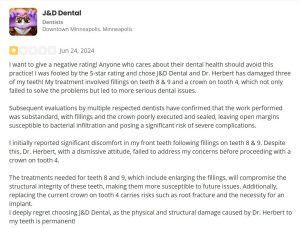Patient’s Negative Review of Her Dentist Wasn’t a “Matter of Public Concern”–J&D Dental v. Hou
Over a dozen years ago, I did a whole thing about healthcare providers suing their patients for defamation. I helped build the DoctoredReviews website to advocate against Medical Justice’s weaponization of copyright and contracts to get around Section 230. I wrote articles to medical professionals telling them not to sue their patients. I even gave some talks at doctor conferences.
I also blogged doctor-vs.-patient cases as I saw them–which I will keep doing as I see ’em, but they don’t hit my alerts very often. That makes this case unusual.
This case is also unusual because I believe it’s the first time I’m blogging a case interpreting the Uniform Public Expression Protection Act (UPEPA), the model state anti-SLAPP law promulgated in 2020 and now enacted in over a dozen states. A reminder that I am a longtime board member of the Public Participation Project, which has been advocating for a federal anti-SLAPP law.
* * *
 The defendant Hou got dental services from J&D Dental in 2023 and 2024. Hou was unhappy with the dental work and attempted to negotiate compensation for her experiences, coupled with threats to take her complaints public on social media. The parties didn’t resolve their differences, and in June 2024 Hou posted a string of negative Google reviews. (Here is a Yelp version that shows the details about Hou’s complaints. You can judge for yourself if you think it addresses matters of public concern).
The defendant Hou got dental services from J&D Dental in 2023 and 2024. Hou was unhappy with the dental work and attempted to negotiate compensation for her experiences, coupled with threats to take her complaints public on social media. The parties didn’t resolve their differences, and in June 2024 Hou posted a string of negative Google reviews. (Here is a Yelp version that shows the details about Hou’s complaints. You can judge for yourself if you think it addresses matters of public concern).
J&D sued Hou for defamation, and Hou sought a UPEPA special motion to dismiss, which the district court denied because it felt the review was not a matter of public concern.
The appellate court attempts to figure out what UPEPA’s “matter of public concern” standard means, and it provides a typical appellate court non-answer:
whether a civil action is based on speech “on a matter of public concern” and thus within the scope of the Uniform Public Expression Protection Act, is determined, consistent with common law interpretation of the phrase in the defamation context, on a case-by-case basis given the totality of circumstances, taking into consideration the content, form, and context of the speech, as well as any other pertinent factors
In other words, litigators, START YOUR ENGINES. Everything is up for grabs.
In this case, the “majority of Hou’s speech recounts an individual grievance about her personal experience at J&D Dental….Hou did not connect her experience directly to a community or broader movement and did not set forth a detailed explanation of her motives.” Thus, the court says that her review wasn’t a matter of public concern, and the defamation claims will proceed through the normal process.
From my perspective, any truthful negative information about healthcare providers shared publicly on social media or on a review site automatically should be considered a matter of public concern because problematic healthcare providers pose obvious and important public health dangers. This view has not been universally adopted, and the court doesn’t buy it here:
Although courts in other jurisdictions have concluded that certain speech related to healthcare and healthcare providers involved matters of public concern, our close review of those cases reveals that the speech at issue was not limited to a personal grievance with a particular provider but instead reached matters of broader public import
For savvy gripers, this line-drawing does provide some guidance. In their negative reviews, they could connect their gripes about their healthcare provider to larger public debates about our healthcare system and they should have better legal standing.
For more on consumer reviews and matters of public concern, see my 2011 roundup, largely reaching the same conclusion as this court.
Case Citation: J&D Dental v. Hou, 2025 WL 2639538 (Minn. Ct. App. Sept. 15, 2025)
